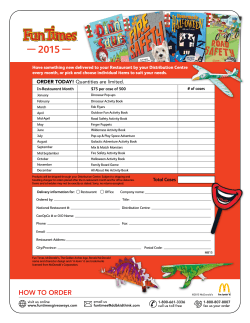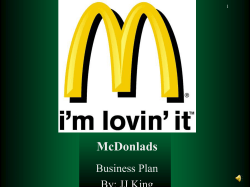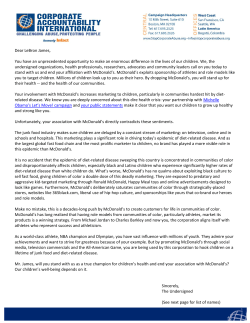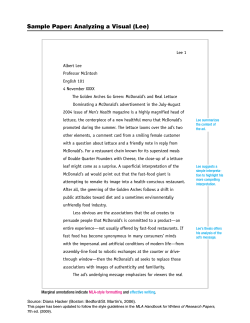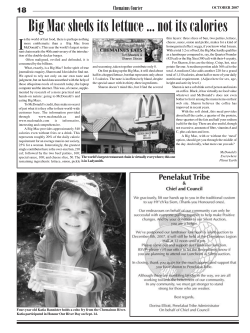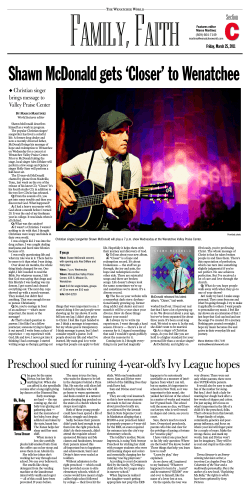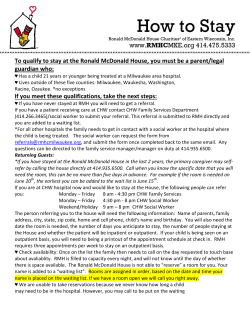
FAST FOOD RESTAURANT CASE 06 MARKETING MANAGEMENT GROUP 06
FAST FOOD RESTAURANT CASE 06 MARKETING MANAGEMENT GROUP 06 CONTENT INTRODUCTION SUBWAY : SUCCESS FACTOR OF SUBWAY MCDONALD’S HISTORY COMPETITOR 7P OF MCDONALD’S NOWADAYS ISSUE RE-BRANDING : THE MCDONALD’S STRATEGY INTRODUCTION Fast food is the term given to food that can be prepared and served very quickly. Fast food outlets are take-away or take-out providers, often with a "drive-through" service which allows customers to order and pick up food from their cars; but most also have a seating area in which customers can eat the food on the premises. VARIANT OF FAST FOOD Fast food often brings to mind traditional American fast food such as hamburgers and fries. The other variant of fast food : Japan : Sushi, Bento United States : Pizza Middle East Asia : Kebab United Kingdom : Fish and Chips WHY FAST FOOD RESTAURANT GROWS FASTLY? With today’s hectic lifestyles, time-saving products are increasingly in demand. One of the most obvious examples is fast food. The fast food industry focuses heavily on rapid consumer turnover, speed of service, take-out sales, and less expensive price compare to table service restaurant meals. SUBWAY Subway is a fast food franchise that primarily sells submarine sandwiches, salads and personal pizzas. It is owned and operated by Doctor's Associates, Inc. (DAI). Subway is one of the fastest growing franchises in the world with approximately 31,835 restaurants in 91 countries as of September 2009.It is the largest single-brand restaurant chain globally and is the second largest restaurant operator globally after Yum! Brands (35,000 locations). SUCCESS FACTOR OF SUBWAY Menu reflects demand for fresh, healthy and fast. Partnering with the American Heart Association. Worldwide brand recognition. Customizable menu offerings. Low franchisee start up costs Size and number stores and channels McDonald’s McDonald’s Corporation, known as McD, started it business from 1940. McD primarily sells hamburgers, cheese burgers, chicken products, and french fries. More recently, it has begun to offer salads, wraps, and fruit. McD is the world's largest chain of fast-food restaurants with more than 31,000 local restaurants serving more than 58 million people in 118 countries each day. Low price, speed, service and cleanliness became the critical success factor of the bussiness. McDonald’s McD is looking for homogeneous consumer groups and replicating the same format in foreign countries, making only minor changes to suit the local or national preferences but recognizably maintaining the original concept. India Thailand Dubai Indonesia McDonald’s Despite the diverse environments, most outlets were operated using the same reward systems, the same hierarchical management structure, and the same routine for serving food. McD centralized the design of its service concept, restaurant layout, the selection of franchisees and other personnel, and the design and content of training of restaurant managers and staff. Such strategy, structure, and uniformity have made McDonald’s the brand name that defined American fast food. COMPETITOR Yum! the world's largest fast food restaurant company in terms of system units Fortune 500 coorparations, that operates or licenses Taco Bell, KFC, Pizza Hut, and A&W restuarant Subway The third largest fast food operator globally afterYum! Brands and McDonalds How McD become a global brand By franchising, McD are able to expand rapidly across countries. Establish Hamburger University that only aim to train franchisees and corporate decision-makers. McD MISSION “McD mission is to be the world’s best quick service restaurant experience. Being the best means providing outstanding quality, service, cleanliness, and value, so that we make every customer in every restaurants smile.” 7P OF McD McDonald’s overall strategic plan is called Plan to Win: created better McDonald’s experiences through the execution of multiple initiatives surrounding the five factors of exceptional customer experiences – product, price, place, promotion, people, physical evidence, process. PRODUCT Hamburgers Various types of chicken sandwiches French fries Soft drinks Breakfast items Dessert Salads Vegetarian items Wraps PRICE McDonald’s has a unique pricing strategy that falls solely on their many product lines. The most notable and recent example of this is McDonald’s “Dollar Menu”. PLACE Number of locations more than 31,000 worldwide. Type of restaurant : counter service drive-through service gas stations convenience stores shopping mall McStop PROMOTION Happy meals McDonald’s used to give children a choice between toys, milk, fruit, or vegetables as part of their Happy Meals. Slogan “I’m Lovin’ it” PEOPLE Stars as their performance Gives employee larger role in decision Philosophy of quality, service, cleanliness, and value is the guiding force behind its service Fast friendly service PHYSICAL EVIDENCE Cleaness Speed Quality Transparency PROCESS Food manufacturing transparent to the customers Training to the licenses Invented the most efficient cooking equipment New method of food packaging and distribution FALLEN OF McD In 2002, McDonald’s posted its first loss. Earnings were $893.5 million, down 45 per cent from $1.64 billion in 2001. McDonald's share of fast-food sales in the U.S. has slipped almost two percentage points, to 16.2%. The drop has come even as the company has increased its number of restaurants by 50%, and the Total revenue from 2001 to 2002 just increased for 3.6%. Table : McDonald’s Revenue (dollars in millions) 2000 Total Revenue 2001 2002 14,243 14,870 15,406 Operating Income 3,330 2,697 2,113 Net Income 1,977 1,637 893 Source: McDonald’s financial report 2004 Net Income (2001-2002)= (893-1,637)/1,637= 45.5% Total Revenue (2001 -2002) = (15,406-14,870)/14,870 = 3.6% What went wrong? The most fundamental problem the is the quality of its food. While the company focused on building more stores, consumers have decided they want better food and more variety. HEALTH ISSUE Obesity • According to the Massachusetts Medical Society Committee on Nutrition, fast food is especially high in fat content, and studies have found associations between fast food intake and increased body mass index (BMI) and weight gain. Food poisoning • Manure gets mixed with meat, contaminating it with salmonella and Escherichia coli 0157:H7. E. coli 0157:H7 is one of the worst forms of food poisoning. Usually spread through undercooked hamburgers . ENVIRONMENTAL ISSUE The biggest environmental nightmare for McDonald’s : Waste Packaging Global warming Obesity and Well being issue There is increasing concern about obesity rates and related risks to well-being, and a holistic approach by McDonald High-Quality Choices - Continue to develop high quality menu offerings that provide customers with a range of choices that meet their needs and preferences and that fit in a balanced diet. Consumer-Friendly Nutrition Information - Enable consumers to make the right decisions - continuing to provide even easier access to nutrition information Communicate Responsibly - Continue to refine marketing and communication practices, particularly to children High-Quality Choices Examples of nutrition information on the packaging. Communicate Responsibly particularly to the children NUTRITION INFO Enviromental issue McD efforts on minimizing environmental impact of restaurants business Energy efficiency – Find further ways to increase energy efficiency in restaurants to save money and reduce our environmental impact. In 2007 and 2008, McDonald’s was ranked second among food service companies by Climate Counts, designating the company in the organization’s “Starting” category, as a “better choice for the climate conscious consumer.” McDonald’s restaurant managers are equipped with a variety of energy management tools, including restaurant energy surveys and audits, and in selected restaurants, Energy Management Systems (EMS). In 2007, McDonald’s USA was named an Energy Star Partner of theYear by the U.S. Environmental Protection Agency. Sustainable Packaging & Waste Management – Continue exploring ways to reduce environmental impacts of consumer packaging and waste in restaurant operations. Green Restaurant Design – Enhance our current strict building standards to incorporate further opportunities for efficiency and innovation in the design and construction of our restaurants. McDonald’s France Beaugrenelle restaurant in Paris with an array of sustainability enhancements and environmentallythemed decor. Re-branding: the McDonald’s strategy McDonald’s Value We place the customer experience at the core of all we do We are committed to our people We believe in the McDonald’s System We operate our business ethically We give back to our communities We grow our business profitably We strive continually to improve We place the customer experience at the core of all we do Allowing franchisees to launch extensive experiments in food and décor, launching “I’m lovin’ it” marketing theme Providing the customers with high quality food and superior service, in a clean, welcoming environment, at a great value. We are committed to our people Talented people, with diverse backgrounds and experiences, working together in an environment that fosters respect and drives high levels of engagement, is essential to continued success. McD Employee Benefits are organized into 4 categories: Health and Protection Pay and Rewards Investing Employee future Helping Balancing Employee work and life People Priority: McDonald’s Approach is to address all employees' interests Respect - Create a diverse and inclusive culture where everyone feels valued and respected. Commitment Enhancement - Continue to enhance our employment value proposition to drive high levels of employee commitment. Talent Management - Attract, develop and retain the most talented people at all levels. We believe in the McDonald’s System The balance of interests among the three groups : owner/operators, suppliers, and company employees. We operate our business ethically McDonald’s conducts its business to high standards of fairness, honesty, and integrity. And the people are individually accountable and collectively responsible. We give back to our communities • Support Ronald McDonald House Charities • Support World Children’s Day •“ Ronald McDonald Reading Corner “, to utilize Ronal McDonald to promote early literacy. •Increase financial and volunteer support to RMHC •Partnerships and sponsorships •Owner/Operator Involvement •Disaster Relief McDonald’s Champion Kids programs McDonald’s serves as the Official Restaurant of the Olympic Games More than 930 restaurants, McDonald’s China will support the kind blood donors with a free orange juice and hamburger to replenish their nutrients, upon their presentation of a blood donation certificate (Sichuan region earthquake relief efforts) We grow our business profitably Provide sustained profitable growth for our shareholders. Requires a continuing focus on customers and the health of the company. We strive continually to improve Anticipate and respond to changing customer, employee and system needs through constant evolution and innovation. CONCLUSION Nowadays fast food are recognized as an unhealthy food However: their income keep on growing, because: they offer: speed, cleanliness, and delicious food. McDonalds do their repositioning from unhealthy to healthy fast food. Octawati Buntaran M987Z249
© Copyright 2026
